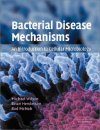Textbook
By: M Wilson, R McNab and B Henderson
6560 pages, Bw plates, illus, figs, tabs
![Bacterial Disease Mechanisms: An Introduction to Cellular Microbiology Bacterial Disease Mechanisms: An Introduction to Cellular Microbiology]()
Click to have a closer look
About this book
Contents
Customer reviews
Biography
Related titles
About this book
Antibiotic resistance and our consequent inability to treat many bacterial infections had fuelled an urgent need to understand the means by which bacteria cause disease. This has lead to a renaissance in research into bacterial disease mechanisms and the birth of a new discipline - cellular microbiology. The fruits of such research and how they have lead to an alternative perspective on bacteria-host interactions are described in this introductory textbook. The central premise is that bacteria have evolved means of manipulating normal host cell functions and overcoming host defence systems to ensure their survival. As well as offering an interesting perspective on the classical bacterial virulence mechanisms, this book outlines the molecular techniques developed to unravel the complexity of bacteria-host interactions. Research may lead not only to a better understanding of disease mechanisms, but also to alternative means of preventing and/or treating bacterial infections.
Contents
Preface; Abbreviations used; 1. An introduction to bacterial diseases; 2. Bacterial cell biology; 3. Molecular analysis of bacterial virulence mechanisms; 4. Communication in infection; 5. The mucosal surface: the front line of antibacterial defence; 6. Immune defences against bacteria; 7. Bacterial adhesion as a virulence mechanism; 8. Bacterial invasion as a virulence mechanism; 9. Bacterial exotoxins; 10. Bacterial evasion of host defence mechanisms; 11. Bacteria in human health and disease: the future?; Appendix A. Glossary of terms used; Appendix B. Brief descriptions of bacteria frequently mentioned; Index.
Customer Reviews
Biography
Michael Wilson is currently Professor of Microbiology in the Faculty of Clinical Sciences, University College London, and Head of the Department of Microbiology at the Eastman Dental Institute, University College London. He is the co-editor of Community Structure and Co-operation in Biofilms, 2000 (0521793025) and editor of Bacterial Adhesion to Host Tissues, 2001 (0521801079). His main research interests are bacterial virulence factors, biofilms and the development of new antimicrobial strategies. Brian Henderson is Professor of Cell Biology and Head of the Cellular Microbiology Research Group at the Eastman Dental Institute, University College London. His research centres around cytokine biology and the interactions of bacteria with myeloid and lymphoid cells. Rod McNab is Lecturer in Molecular Microbiology at the Eastman Dental Institute, University College London, and works on streptococcal adhesion and colonization factors, biofilms and bacterial cell-cell communication.
Textbook
By: M Wilson, R McNab and B Henderson
6560 pages, Bw plates, illus, figs, tabs
'... it could also serve as a comprehensive reference book for researchers ...' Trends in Immunology '... well written and is no doubt a valuable addition. I would certainly recommend this book to undergraduates ...' Biologist 'This book would be an extremely good text for a microbial pathogenesis course, especially for advanced undergraduates and graduate students. ... it is written clearly enough that even the novice could understand the text. In fact, clarity is a major strength of the text. There is excellent ... coverage of the cell and molecular biology of both bacteria and hosts. Overall, the text is very usefully organized, containing helpful adjuncts and appendices. Each chapter has a bibliography, which is both thorough and modern. In sum, I would score this book as a 'must' for anyone interested in the area of microbial pathogenesis.' Journal of Parasitology '... a welcome teaching tool for introducing students to this rapidly growing field ... thoughtful layout and clear presentation ... it is clearly designed with the student in mind and offers numerous teaching tolls ... overall, the authors do an impressive job.' Jeffery S. Cox, Cell



































